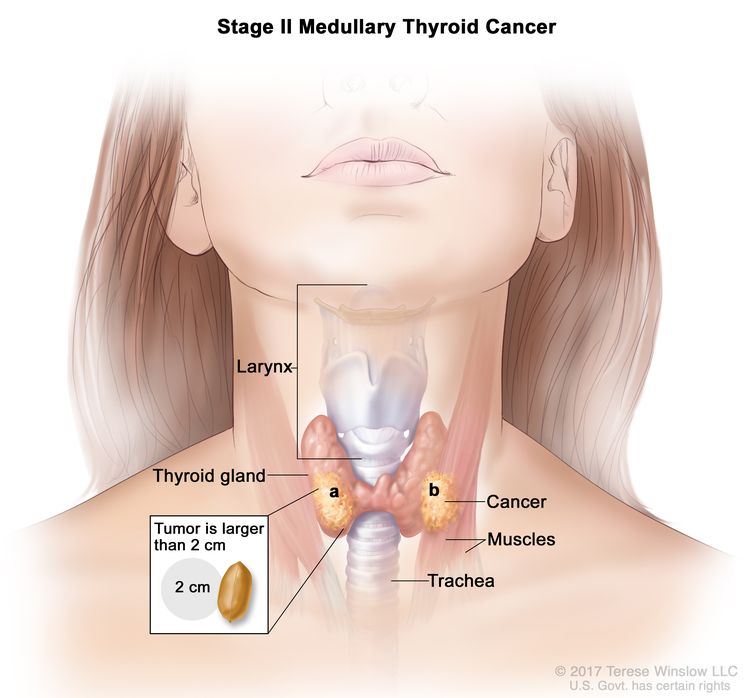Thyroid Cancer (Papillary, Follicular, Medullary, Anaplastic)

Overview
Thyroid cancer is a type of cancer that starts in the thyroid gland, located at the base of the neck. It is often diagnosed early and is highly treatable in most forms. There are four main types:
- Papillary thyroid carcinoma: most common and least aggressive
- Follicular thyroid carcinoma: similar prognosis to papillary
- Medullary thyroid carcinoma: originates in C cells, can be hereditary
- Anaplastic thyroid carcinoma: rare and highly aggressive
Symptoms
- Lump or swelling in the neck
- Hoarseness or voice changes
- Difficulty swallowing or breathing
- Persistent cough
- Enlarged lymph nodes in the neck
Causes & Risk Factors
- Exposure to ionizing radiation (especially during childhood)
- Family history of thyroid cancer
- Genetic syndromes (e.g., MEN2 for medullary cancer)
- Female gender and age 30–60
Diagnosis
- Physical neck examination
- Ultrasound imaging of the thyroid
- Fine-needle aspiration (FNA) biopsy
- Blood tests (thyroglobulin, calcitonin for medullary type)
- Genetic testing (for hereditary medullary cancer)
Treatment Options
- Surgery (thyroidectomy or lobectomy)
- Radioactive iodine therapy (for papillary and follicular types)
- Thyroid hormone replacement therapy
- External beam radiation or chemotherapy (for anaplastic or advanced cases)
- Targeted therapy (e.g., RET or BRAF inhibitors for metastatic disease)
Prognosis
- Papillary & follicular: excellent prognosis, >90% 10-year survival
- Medullary: good if detected early, depends on genetic factors
- Anaplastic: poor prognosis, median survival 6 months
Living with this Cancer Type
- Lifelong thyroid hormone replacement
- Regular follow-up with blood tests and imaging
- Nutritional and emotional support
- Genetic counseling for medullary subtype
Prevention & Screening
- No general screening
- Genetic screening in families with MEN2 or known RET mutations
- Minimize unnecessary radiation exposure to the neck
FAQs
Q: Is thyroid cancer curable?
A: Yes, especially papillary and follicular types with early treatment.
Q: Can I live without a thyroid?
A: Yes, with daily hormone replacement therapy.
Q: Should my family be tested for medullary cancer?
A: Yes, if you have MEN2 or RET gene mutations.
Resources
- American Thyroid Association (thyroid.org)
- ThyCa: Thyroid Cancer Survivors’ Association
- ClinicalTrials.gov
Understand Precision Testing
Learn how liquid biopsy and chemo sensitivity testing can personalize your treatment plan.
Make Informed Decisions
Gain knowledge to actively participate in treatment discussions with your healthcare team.
Improve Treatment Outcomes
Discover how precision medicine and metabolic therapies can enhance treatment effectiveness.
Start Your Educational Journey Today
Empower yourself with knowledge about precision metabolic oncology and take an active role in your cancer care journey.
Need More Information?
Our team of oncology experts is here to help you understand your diagnosis and treatment options.
